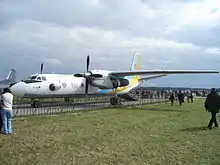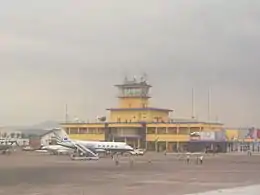2007 Africa One Antonov An-26 crash
The 2007 Africa One Antonov An-26 crash occurred when a twin engine Antonov An-26, belonging to the Congolese air carrier Africa One, crashed and burned shortly after takeoff from N'djili Airport in Kinshasa, Democratic Republic of the Congo on October 4, 2007. The flight left N'djili at 10:43 local time bound for Tshikapa, a distance of 650 km to the east.[2][3]
 Antonov An-26 at the Radom Air Show | |
| Accident | |
|---|---|
| Date | October 4, 2007 |
| Summary | Under investigation |
| Site | N'djili Airport, Kinshasa, Democratic Republic of the Congo 4.40°S 15.41°E |
| Total fatalities | 51 (including 30 on the ground)[1] |
| Total injuries | At least 30 |
| Aircraft | |
| Aircraft type | Antonov An-26 |
| Operator | Malift Air |
| Registration | 9Q-COS |
| Occupants | 22 |
| Passengers | 17[1] |
| Crew | 5 |
| Injuries | 1 (possibly 2) |
| Survivors | 1 (possibly 2) |
| Ground casualties | |
| Ground fatalities | 30 |
| Ground injuries | At least 29 (or 28) |
Background
The flight was variously reported as operated by El Sam Airlines or Malila Airlift, with the aircraft leased from Africa One. Both carriers are on the list of air carriers banned in the EU, as are all but one of the Congolese airlines. The aircraft was an Antonov An-26, registered 9Q-COS.[4]
The flight was a commercial cargo flight carrying at least 28, including a flight crew of five.[5] The flight manifest stated that there were 16 passengers aboard, but more boarded the flight shortly before takeoff.
Crash
The Russian foreign ministry reports that the aircraft lost a propeller, then a wing struck an obstacle, shearing the wing off prior to crashing.[4] Striking a market before coming to rest at a residence at 77 Mayulu Av in the Kingasani district of the Kimbanseke commune, at least 30 people on the ground were killed.[1] The reports of survivors are conflicting: initial reports had all aboard killed, including the Russian pilot, copilot and flight engineer, yet later Reuters reported that an on-board mechanic survived,[4] while Associated Press claims a flight attendant also survived,[6] bringing the total number of survivors to two.
Mechanic's account

The on-board mechanic, M. Dédé Ngamba, was possibly the sole surviving passenger. His description (in French) was,
Nous avons décollé après trois minutes de taxi. Aussitôt, j’ai constaté que l’avion s’est mis à tanguer. L’effort du pilote de faire monter l’avion est demeuré vain. C’est alors que l’hôtesse m’a dit de mettre la ceinture de sécurité. En ce moment, l’avion a commencé à voler plus bas et il a percuté un palmier et perdu une aile. Ensuite, il a commencé à percuter des maisons. Tous les colis des marchandises qui étaient à bord ont fait mouvement vers l’avant de l’avion. J’ai aperçu à côté de moi un trou par lequel je suis sorti sans savoir comment, et je suis tombé sur une flaque d’eau sablonneuse. J’ai pu alors contempler les flammes de l’avion qui consumait. Il ne s’agissait pas d’un poids exagéré. C’est une simple défaillance mécanique.[7]
This translates loosely to the following:
We had taken off after taxiing for three minutes. At once, I noted that the plane started to pitch. The effort of the pilot to right the plane remained vain. At this point in time the stewardess told me to put on my seat belt. At that time, the plane started to fly low and it struck a palm tree and lost a wing. Then it started to strike houses. All the parcels of goods which were on board shifted toward the front of the plane. I noticed beside me a hole by which I left without knowing how, and I fell into a mud puddle. I then could contemplate the flames which consumed the plane. It was not about excess weight. It's a simple mechanical failure.
Aftermath
The crash was similar to the 1996 Air Africa crash, which also involved an Antonov An-32 overshooting the runway (albeit at Kinshasa's other airport N'Dolo) with massive casualties on the ground. The DRC has an aviation safety track record that has been dubbed "an embarrassment" by the IATA, and the Transport Minister Rémy Henri Kuseyo Gatanga was fired by the President for culpable negligence in failing to enforce adequate standards and procedures for aviation safety management.[8][9][10] One source indicates that the lifting of the Transport Minister's ban on Antonov flights over DRC territory was not by his order but rather that of the Minister of State to the Head of State.[11]
A formal Parliamentary commission of inquiry was convened 19 October 2007, with Jean-Lucien Bussa as president and Lessendjina as vice-president. The prosecutor's office of N'Djili is seized of the matter.[12]
Notwithstanding the ban, another Antonov (this one an An-12 registered as ER-AXI) was reported by Radio Okapi to have had a minor motor fire at Bangoka International Airport at Kisangani early in the afternoon of 1 November 2007. No injuries and minor damage were reported.[13]
Three months after the crash, Moscow offered US$200,000 in economic aid to the injured parties.[14]
See also
References
| Wikinews has related news: |
- "Accident Details". PlaneCrashinfo.com. PlaneCrashinfo.com. Archived from the original on 11 December 2015. Retrieved 24 December 2016.
- "Flames hold up rescuers at DR Congo plane crash". Agence France-Presse via Google News. 2007-10-05. Archived from the original on 2008-03-17. Retrieved 2007-10-05.
- "Death toll from Congo plane crash rises to 39; transport minister fired". Associated Press via International Herald Tribune. 2007-10-04. Retrieved 2007-10-05.
- Bavier, Joe (2007-10-05). "Congo crash toll over 50, but survivor found". Reuters. Archived from the original on October 13, 2008. Retrieved 2007-10-05.
- "Kinshasa, the victims of the crash are at least 50". Avionews. 2007-10-08. Retrieved 2007-10-08.
- "Plane Crashes in Congo, Killing 25". The New York Times. 2007-10-05.
- Digital Congo coverage (in French) Archived 2007-10-18 at the Wayback Machine 2007-10-05
- Bavier, Joe. "Crash d'un Antonov 26 à Kinshasa: Un "cercueil volant" a encore tué hier à Kingasani" [Crash of an Antonov 26 in Kinshasa: A "flying coffin" still killed yesterday in Kingasani] (in French). Le Potentiel. Retrieved 2007-10-05.
- "Révocation du ministre des Transports en retombées de la catastrophe du crash d'Antonov survenu à Kinshasa" (in French). Digital Congo. Archived from the original on 11 October 2007. Retrieved 2007-10-06.
- "Old DR Congo aircraft 'still flying' after crash". Agence France Press. Archived from the original on 2007-11-28. Retrieved 2007-10-07.
- "press summary". MONUC. Retrieved 9 October 2007.
- "La Commission d'enquête de l'Assemblée nationale sur le crash d'Antonov à Kingasani à pied d'œuvre" [The National Assembly inquiry committee on the Antonov crash in Kingasani at work] (in French). Digital Congo. 2007-10-23. Archived from the original on 28 October 2007. Retrieved 2007-11-01.
- "Kisangani: un Antonov en feu, pas de victimes" [Kisangani: Antonov on fire, no casualties] (in French). Radio Okapi. 2007-11-01. Retrieved 1 November 2007.
- "Crash de Kingasani : Moscou offre 200 000 Usd aux sinistrés" [Kingasani crash: Moscow offers 200,000 Usd to the victims] (in French). Kinshasa: Digital Congo. 2008-01-22. Archived from the original on 26 February 2008. Retrieved 6 February 2008.